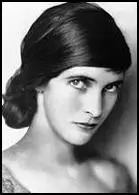Agnes Boulton

Agnes Boulton, the daughter of the artist, Edward W. Boulton, was born on the 19th August 1892. The family moved to Philadelphia and later settled in Point Pleasant, New Jersey.
After finishing her education she wrote for magazines such as Breezy Stories, Snappy Stories and Young's Magazine.
In October 1917, Agnes Boulton met Eugene O'Neill, a struggling playwright. He had just ended an affair with the journalist, Louise Bryant. She was told by friends of O'Neill that she "bore a strong physical resemblance to her." O'Neill wanted to marry her but she told Alice Woods that he was still in love with "that girl". Woods later recalled: "She wasn't subtle enough to play the game that Gene seemed to be playing." The couple eventually married on 12th April, 1918. Over the next few years the couple had two children, Shane and Oona.
Boulton continued to write and had two stories published by The Smart Set, an important magazine co-edited by Henry L. Mencken and George Jean Nathan. O'Neill continued to write plays and the Provincetown Theatre Group, put on Moon of the Caribbees (1918), Shell-Shock (1918) and The Emperor Jones (1920), a play where a black actor plays the central role.
Louise Bryant arrived back in New York City on 19th February, 1918. On her return Bryant commented that the Russian Revolution had increased her belief in women's suffrage. She immediately wrote to Eugene O'Neill in Provincetown. Agnes later recalled: "Louise wrote that she must see him - and at once. She had left Jack Reed in Russia and crossed three thousand miles of frozen steppes to come back to him - her lover. Page after page of passionate declaration of their love of hers, which would never change. She had forgiven him. What if he had picked up some girl in the Village and become involved? There was no use writing letters - she had to see him! It was all a misunderstanding and her fault for leaving him, for going to Russia with Jack." Boulton persuaded O'Neill not to see Louise.
Eugene O'Neill was an alcoholic. His friend, Art McGinley, commented: "Gene was a periodic drinker, and once started wouldn't stop - I guess he couldn't stop - until he was really sick. He was the most trying morning-after drinker I've ever known. He would gloom up and not say a word, or else talk of suicide, he was so disgusted with himself. But when he stopped drinking, he would work around the clock. I never knew anyone who had so much self-discipline."
Agnes Boulton claimed in her autobiography, Part of a Long Story (1953): "He never seemed to be what is called drunk, but there would be some sudden and rather dreadful outbursts of violence, and others of bitter nastiness and malevolence when he appeared more like a madman than anything else."
In 1929, O'Neill abandoned Agnes Boulton and the children for the actress Carlotta Monterey. The couple moved to the Loire Valley in France, where they lived in the Château du Plessis in Saint-Antoine-du-Rocher.
Eugene O'Neill had poor relationships with his children. He disowned his daughter Oona O'Neill in 1943 for marrying Charlie Chaplin when she was 18 and he was 54. He never saw his daughter again. Eugene O'Neill, Jr., suffered from alcoholism, and committed suicide in 1950 at the age of 40, and Shane O'Neill, a heroin addict who also committed suicide. Oona was also an alcoholic in the last years of her life.
Boulton published a novel, The Road Is Before Us, in 1944. Her memoir of her relationship with O'Neill, Part of a Long Story, appeared in 1958.
Agnes Boulton died on 25th November 1968.
Primary Sources
(1) Agnes Boulton, Part of a Long Story (1958)
Louise wrote that she must see him - and at once. She had left Jack Reed in Russia and crossed three thousand miles of frozen steppes to come back to him - her lover. Page after page of passionate declaration of their love of hers, which would never change. She had forgiven him. What if he had picked up some girl in the Village and become involved? There was no use writing letters - she had to see him! It was all a misunderstanding and her fault for leaving him, for going to Russia with Jack.
(2) Agnes Boulton, Part of a Long Story (1958)
He never seemed to be what is called drunk, but there would be some sudden and rather dreadful outbursts of violence, and others of bitter nastiness and malevolence when he appeared more like a madman than anything else.
